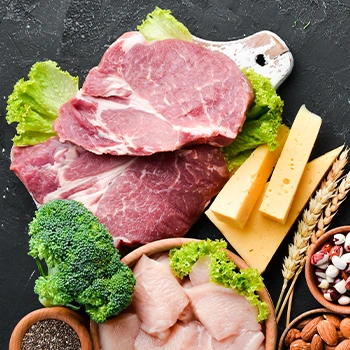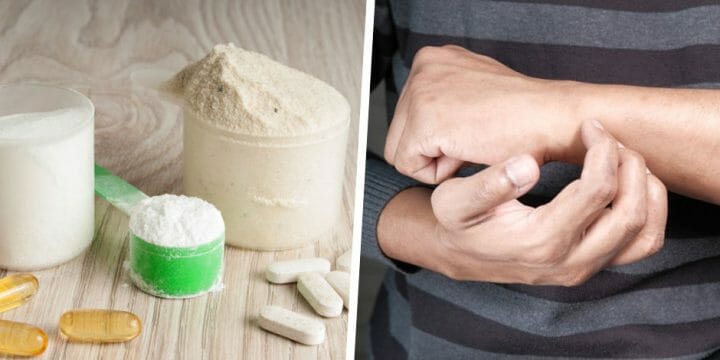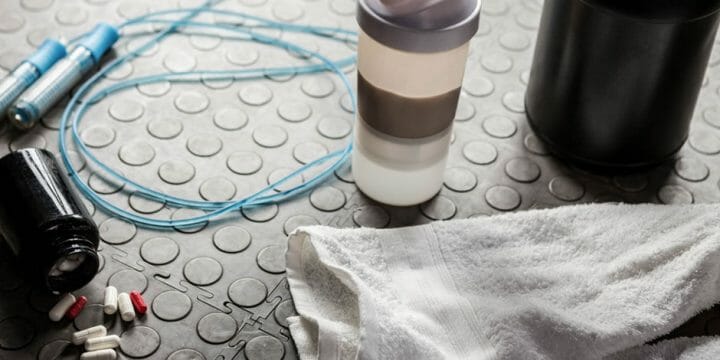After being in the world of fitness for over two decades, I understood how muscles grow intuitively, but I really wanted to gain a deeper and more nuanced understanding of the actual process of muscle protein synthesis.
My curiosity got me going through many studies on this matter, providing me with a better grip on the underlying science. But, naturally, to be pragmatic as well, I also found out how it applies to my workout routine.
To spare you the reading marathon, here is a summary of my findings that should hopefully enable you to work out both hard and smart.
Quick Summary
- Protein synthesis is the process by which the body produces new proteins to repair damaged body tissues.
- Meals that are rich in protein and low in carbohydrates promptly support protein synthesis.
- According to research by the Journal of Physiology, taking 20 grams of protein every 3 hours stimulates muscle protein synthesis better than having smaller doses more often or taking larger doses less often.
- In my two decades as a fitness expert, I've seen that a well-informed approach to protein synthesis can dramatically enhance workout results.
What Is the Process of Protein Synthesis?

Protein synthesis is the process through which our body produces new proteins in order to repair old, damaged tissue and enable all body processes dependent on this vital molecule.
Proteins, made of amino acids, are broken down by stomach acids and enzymes, with the amino acids then absorbed and used for new protein creation, as shown in reports by the National Library of Medicine [1].
What Type of Diet Supports Protein Synthesis?
A type of diet rich in proteins and low in carbohydrates supports protein synthesis.
Eating 20g of protein gives a linearly proportional increase in muscle protein synthesis rate. This simply means that eating 20g of protein will double the MPS rate as opposed to eating 10g as reported by the Journal of Physiology [2].
If you take 20 to 40 grams of protein, an increase in muscle protein synthesis will also occur. However, studies by the American Journal of Clinical Nutrition show that it will be much less noticeable — 40 g will only give you an MPS rate about 10% higher than 20 g will [3].
"Is it 10g of protein more or 10g of protein less, who cares, just get started"
- Kai Greene, American Personal Trainer
What Foods Stimulates Muscle Growth?

Easily digestible food, rich in all essential amino acids, stimulates muscle growth.
From my experience, getting the complete amino acid profile is crucial for muscle growth. I've guided several clients towards incorporating a variety of animal sources like lean meats, eggs, and dairy into their diets, and the results in muscle development have been remarkable.
For older adults, I always recommend easily digestible, high-quality protein sources to help them counter age-related muscle loss.
Though animal-based proteins have higher amino acid concentrations, based on my experience, vegans can actually satisfy these needs by simply consuming larger quantities of plant-based proteins.
Whey is one of the most widespread protein sources, known for high levels of one invaluable amino acid — leucine (which I’ll cover next). It’s also very easy to digest unless you are sensitive to milk proteins or lactose.
Related: Best Amino Acids For Women
The Importance of Leucine
There are nine essential amino acids that you must obtain through your diet in order to make protein synthesis possible.
Leucine is one of those amino acids, and it’s especially important for MPS because increased concentrations of this amino acid have been shown by Sports Medicine to correlate with greater MPS rates [4].
Furthermore, studies by the American Journal of Clinical Nutrition show that when added to low protein doses, relatively small amounts of leucine produced the same effect as large protein doses [5].
How Does Exercise Affect Protein Synthesis?

Exercise affects protein synthesis by causing microscopic damage to the activated muscles, which acts as a signal for protein synthesis to unfold. This has been demonstrated by the study in the Journal of Physiology shown earlier [6].
Essentially, when you make small tears in your muscle tissue due to exertion, muscle protein synthesis occurs in those places and practically “fills the gap," and your muscle mass grows by the exact amount of that gap.
If you’re only starting to work out, MPS primed by exercise will be geared towards repairing broken muscle tissue.
You probably don’t have to max out on each set.
Especially if maxing out makes you unable to do the same number of reps throughout your following sets.
According to the Strength and Conditioning Journal, reps to failure have an accumulative effect, undermining sustained efforts in the long run [6].
On the other hand, not nearing failure has been proven by the Public Library of Science One Journal to provide suboptimal MPS [7].
A 2018 study by the Strength and Conditioning Journal shows that when starting to train, repeating near failure is most beneficial for muscle protein synthesis [8]. Once you grow in strength, it might be best to get as close to failure as you can.
Other Influences on Muscle Protein Synthesis

Carbohydrates: Simultaneous ingestion of proteins and carbs has been shown by the Journal of Clinical Endocrinology & Metabolism to delay the digestion of proteins [9]. However, they have no effect on MPS.
Fats: Not yet thoroughly investigated, the influence of fats on MPS is believed to be negligible.
Insulin: Unlike muscle protein breakdown, natural levels of insulin exhibit no influence on muscle protein synthesis, as shown by studies by the European Journal of Endocrinology [10]. On the other hand, abnormal doses of insulin could stimulate muscle growth, and some bodybuilders make use of this application.
Meal Distribution: To optimize muscle growth, I always emphasize spacing out meals throughout the day. Taking evened-out servings of food rich in protein is more conducive to high MPS rates than having most of your daily protein for dinner.
That said, it's equally important not to overdo it. According to the Journal of Physiology, taking 20g every 3 hours stimulates MPS better than having smaller doses more often or taking larger doses less often [11].
Eating Before Sleep: According to studies published by the Journal of Nutrition, the last meal of the day is beneficial to overnight MPS and leads to increased strength and muscle mass in long-term training programs [12].
In addition, adequate sleep is also essential for optimal muscle repair and growth.
FAQs
Why Is Protein Synthesis Important?
Protein synthesis is important because it maintains the growth of all living organisms. It’s also at the very core of muscle growth.
How Long After a Workout Does Protein Synthesis Last?
synthesis lasts up to 72 hours after a workout. Studies suggest that the body reaches peak muscle protein synthesis within 24 hours after training.
Do Carbs Increase Protein Synthesis?
Carbs don’t increase synthesis, but they do slow down the breakdown of bodily proteins, which indirectly helps you in growing muscle mass.
Should I Devote Each Day to One Muscle Group?
You shouldn’t devote each day to one muscle group. It is best to train the same muscle group twice a week. You experience higher rates of MPS for up to 3 days after the workout, with its maximum around the 24-hour mark. So, waiting for a full week before devoting your training to that one muscle group yet again is a bad idea.
References:
- https://www.ncbi.nlm.nih.gov/books/NBK554481/
- https://www.ncbi.nlm.nih.gov/pmc/articles/PMC3381813/
- https://www.sciencedirect.com/science/article/pii/S0002916523049213?via%3Dihub
- https://link.springer.com/article/10.2165/00007256-199927060-00001
- https://www.sciencedirect.com/science/article/pii/S000291652302275X?via%3Dihub
- https://journals.lww.com/nsca-scj/Citation/1996/06000/Training_to_Muscular_Failure__Is_It_Necessary_.11.aspx
- https://www.ncbi.nlm.nih.gov/pubmed/20711498
- https://journals.lww.com/nsca-jscr/fulltext/2018/01000/effect_of_resistance_training_to_muscle_failure.19.aspx
- https://academic.oup.com/jcem/article/99/6/2250/2538016?
- https://academic.oup.com/ejendo/article-abstract/173/1/R25/6668030?
- https://physoc.onlinelibrary.wiley.com/doi/epdf/10.1113/jphysiol.2012.244897
- https://www.sciencedirect.com/science/article/pii/S0022316622087429?via%3Dihub
About The Author
You May Also Like






